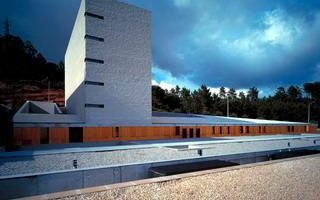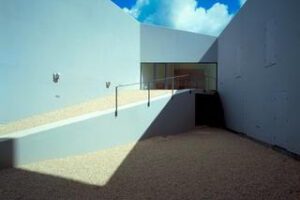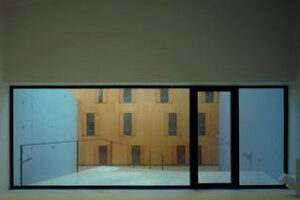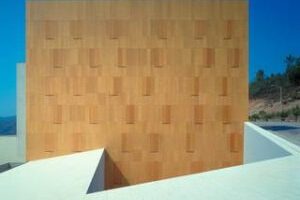



Student Housing at Polo II, Universidade de Coimbra
Main objectives of the project
The project involves recreating the shape of a triangular and sloped site by organizing the lower levels. A tower, reaching the maximum height permitted on the campus, is constructed on this platform and complements other nearby buildings. The primary requirement is to create modules with double bedrooms and living rooms. In the tower, the bedrooms face east, offering a view, while on the ground floor, they overlook the canteen. In the lower levels, the bedrooms are arranged around a cloister.
A two-level space connects the tower and the main living room through a sloping structure. The walls are divided into two groups: the blind walls made of split concrete blocks, determining the height of the building, and the walls with windows clad in wood sheets that incorporate the window portals' measurements. Unlike the white buildings on the campus, this structure blends harmoniously with the surrounding pine forest.
Date
- 2000: Construction
Stakeholders
- Architect: Aires Mateus e Associados
Location
City: Coimbra
Country/Region: Portugal
Description
The project starts with the recreation of the morphology of the site, triangular and slopped through the organisation of the under levels. A tower with the maximum height allowed on the campus rises from this platform and crowns a sequence of vertical elements from the other nearby buildings. The programme mainly required modules with double bedrooms and living rooms. In the tower, the bedrooms are facing east, over the view; on the ground floor they are placed on the south; looking over the canteen; and on the under levels, they are organised around a cloister.
This two-level space is connected by a slope in the sequence of the main living room. Walls are divided in two groups, the blind ones are made of split concrete blocks, with a specific dimension, defining the height of the construction. The walls with windows are clad in wood sheets, integrating the window portals in its metric. As opposed to the white buildings of the campus this one blends with the surrounding pine forest.
